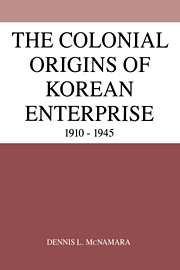2 - Benign Capitalism
Published online by Cambridge University Press: 14 October 2009
Summary
Pak Hŭng-sik pleaded ignorance when accused of cooperation with the Japanese colonial rulers: “I was a businessman unversed in politics.” Unversed perhaps in nationalist politics, Pak was certainly adept in persuading the government of his credibility and hardly shy about his contribution to the growth of commerce on the peninsula. The Min brothers, Kim Yŏn-su, and Pak proved themselves masters at the practical business ideology necessary to gain government support and a share in the domestic marketplace. They faced a challenge in the colony not only of nationalist identity under alien rule, but also of capitalist enterprise in a feudal society. Byron Marshall wrote of “business ideologies” as “ideas expressed by or on behalf of the business class with the manifest intent of creating attitudes favorable to private capitalism.” Cogent ideologies are necessary to support largescale ventures, particularly in the early stages of capitalist development. Local capitalists could find no moral justification for the pursuit of private profit in their own Korean Confucian tradition. The absence of earlier ideologies complicated immediate tasks such as persuading landowners of transfer capital from agriculture to commercial and industrial investments. Add to this the fact that ideologies carried the further burden of somehow legitimating indigenous enterprise under the political rule and economic domination of Japan, and you can sense the complexity of their task.
- Type
- Chapter
- Information
- The Colonial Origins of Korean Enterprise1910–1945, pp. 19 - 33Publisher: Cambridge University PressPrint publication year: 1990

